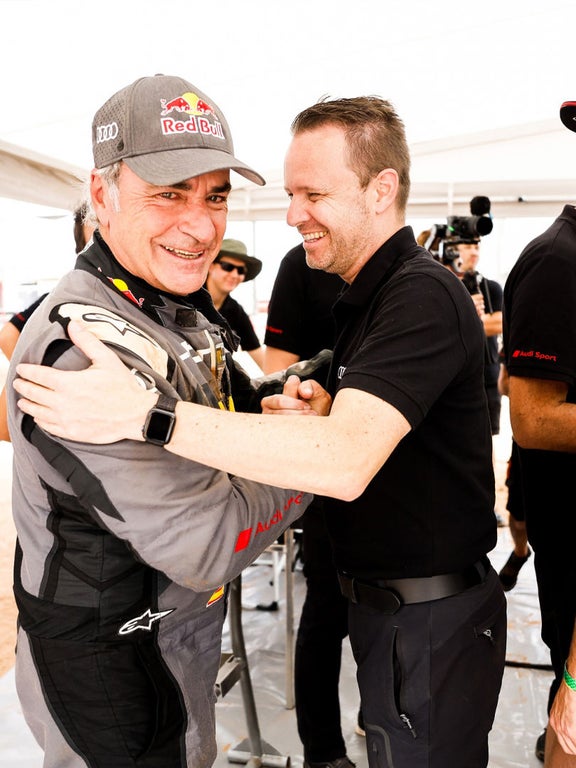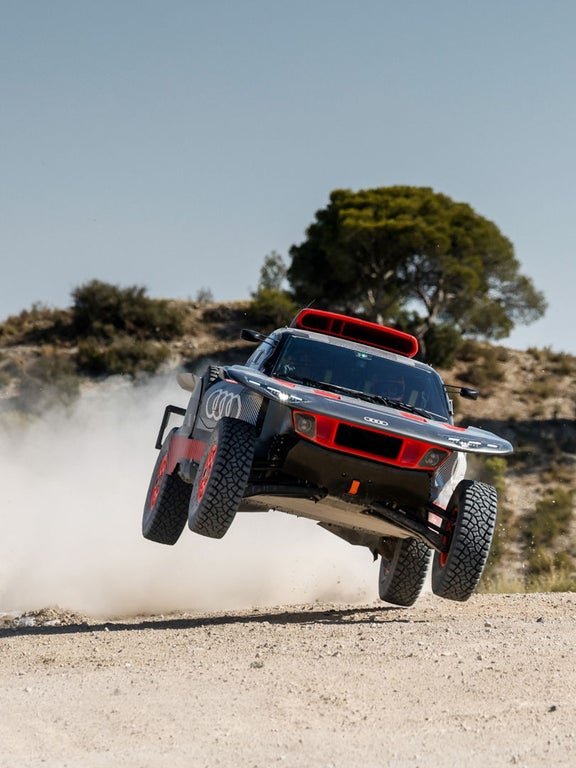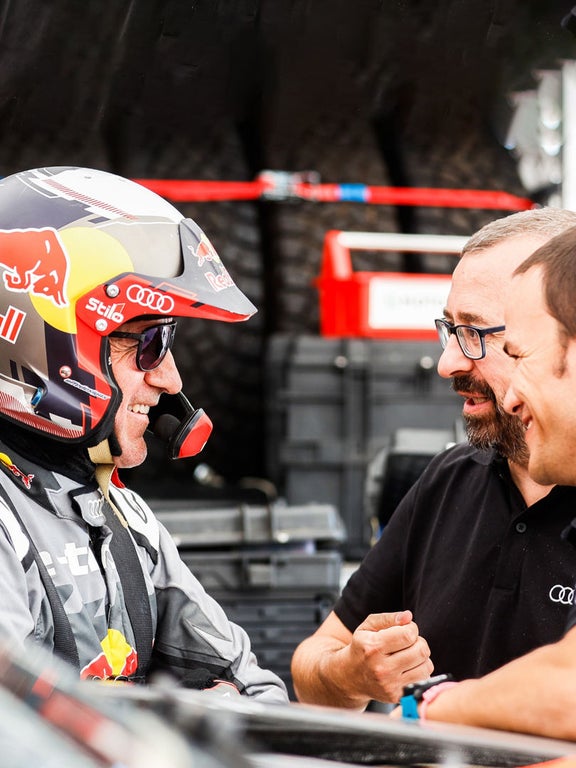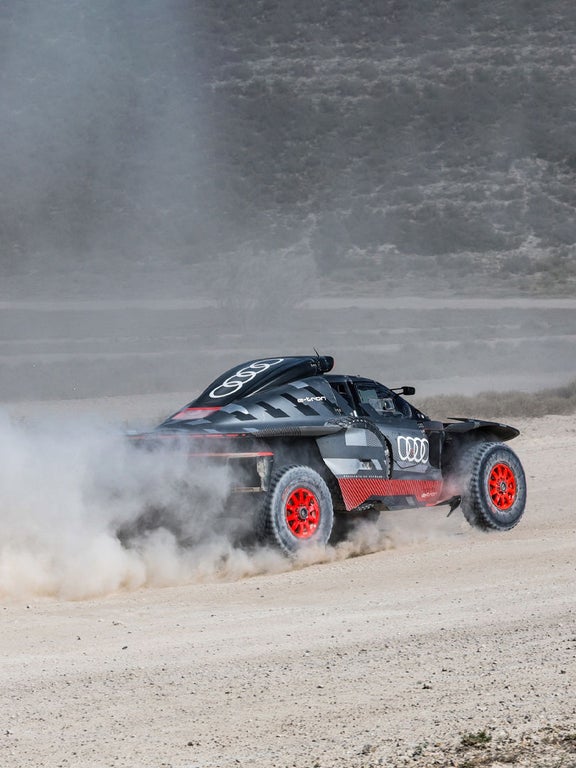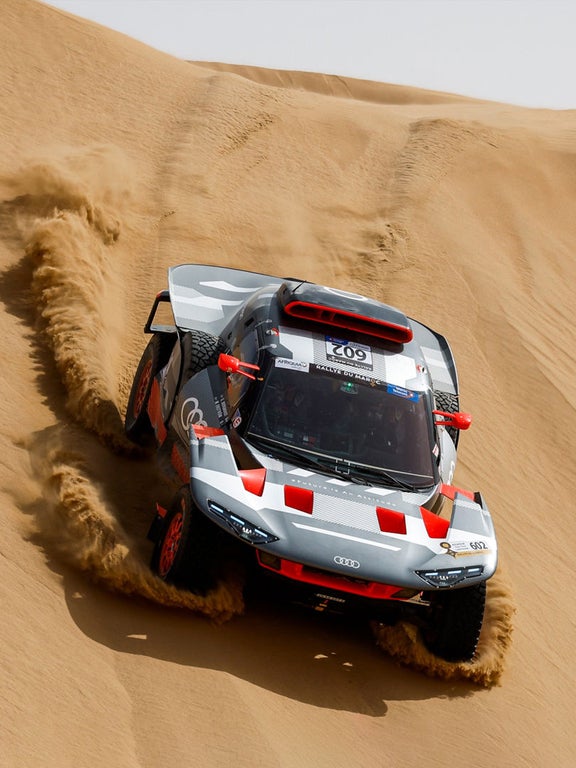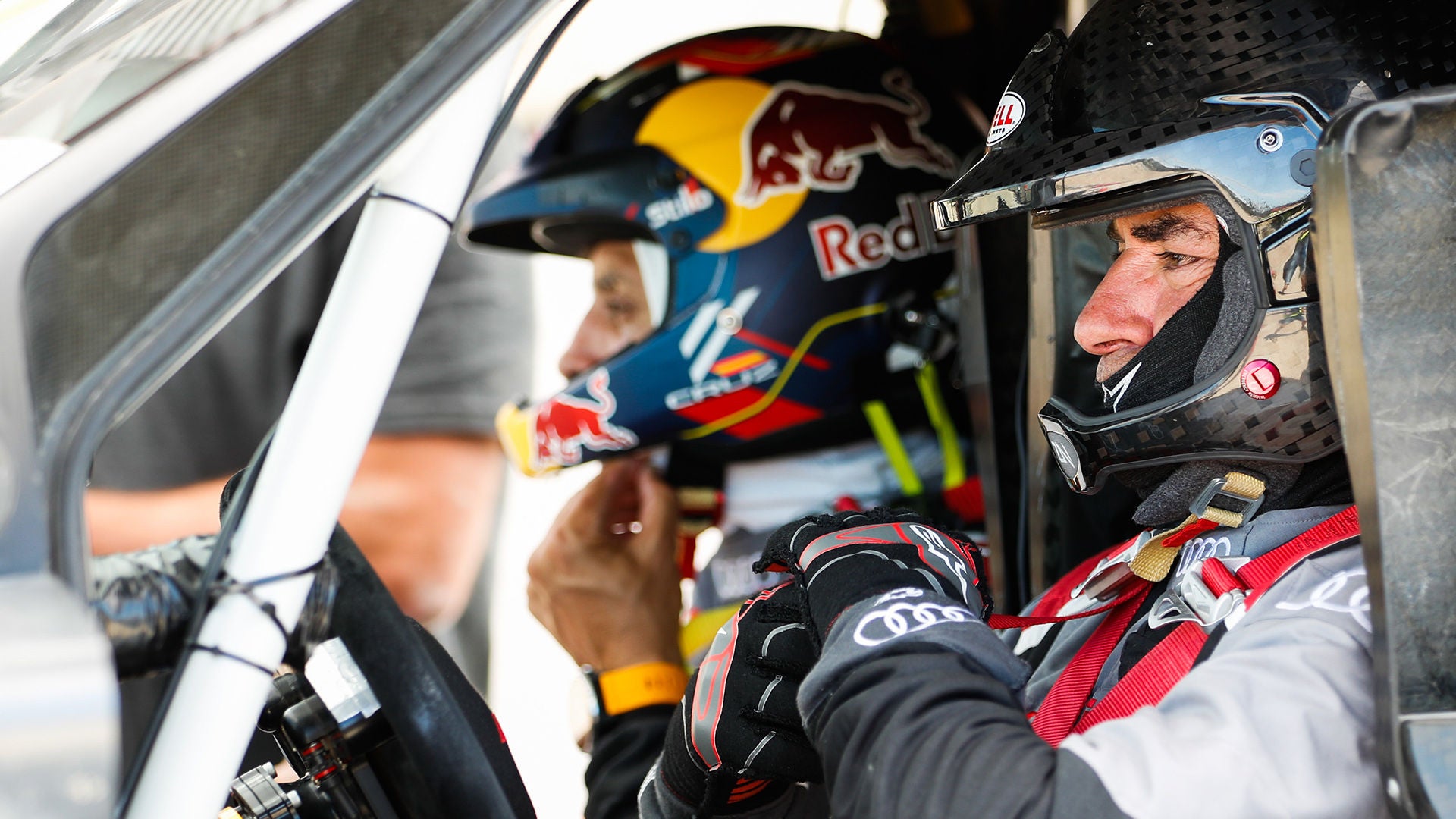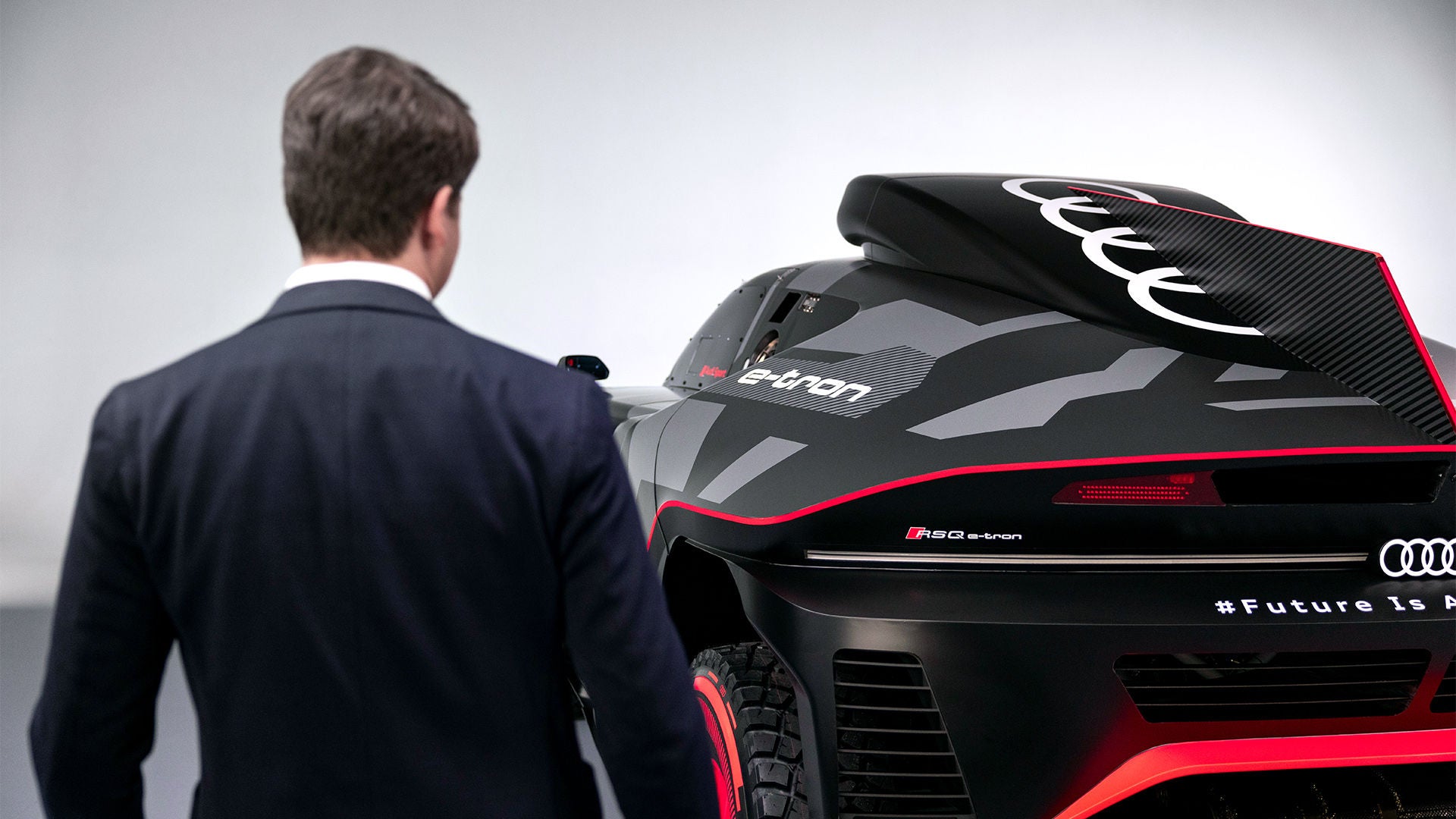Road to Dakar 2023: The countdown is on
missing translation: fa.article-intro.reading-time – Copy: Patrick Morda – Photo: AUDI AG, Julian Rausche – 05/08/2023
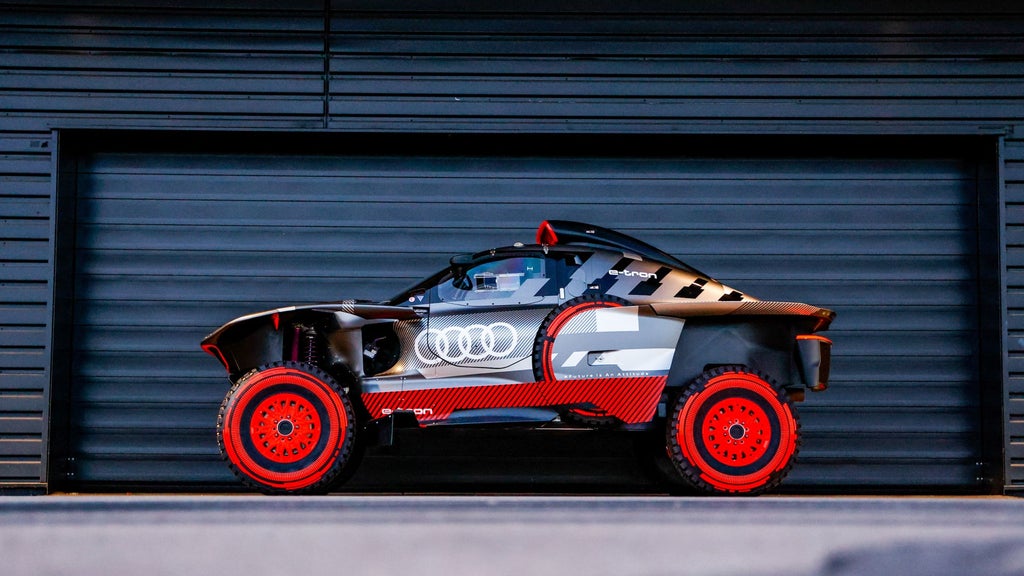
The Audi RS Q e-tron is ready to compete in the 2023 Dakar Rally. The second-generation rally vehicle has undergone fundamental development for its second participation. Before leaving for Saudi Arabia, all three vehicles were checked down to the smallest detail.
The Audi RS Q e-tron is ready to compete in the 2023 Dakar Rally. The second-generation rally vehicle has undergone fundamental development for its second participation. Before leaving for Saudi Arabia, all three vehicles were checked down to the smallest detail.
In the neon light, mechanics and engineers move through a maze of vehicle parts lying on the floor following a strict logic. They come from the three second-generation Audi RS Q e-tron vehicles which will participate in the Dakar Rally on December 31 for the second time for Audi. Now they are jacked up in the halls of Audi Sport in Neuburg an der Donau. After a final endurance test at the Morocco Rally, all three rally vehicles were routinely disassembled into their individual parts in a kind of general overhaul before being reassembled and prepared for the journey to Saudi Arabia. And standing amidst the many parts is Rolf Michl.
“We’ve managed an impressive debut in a motorsports discipline that’s new to us,“ says the Managing Director of Audi Sport GmbH responsible for motorsports at Audi about the first participation in the Dakar Rally at the beginning of 2022. He doesn’t miss the opportunity to be on site himself during test drives and races including the final preparations in Neuburg an der Donau. “I can feel the enormous concentration but also anticipation among the team, which always inspires me.“ According to Michl, the primary goal of the Dakar project was to prove from the outset that the electrified drive concept² would withstand the toughest conditions. And thus, the Audi RS Q e-tron would embody more than just racing. “The project stands for an attitude, for the fact that we at Audi can consistently implement and successfully deploy the electrification strategy.“ And their first appearance in the Dakar Rally was successful indeed.
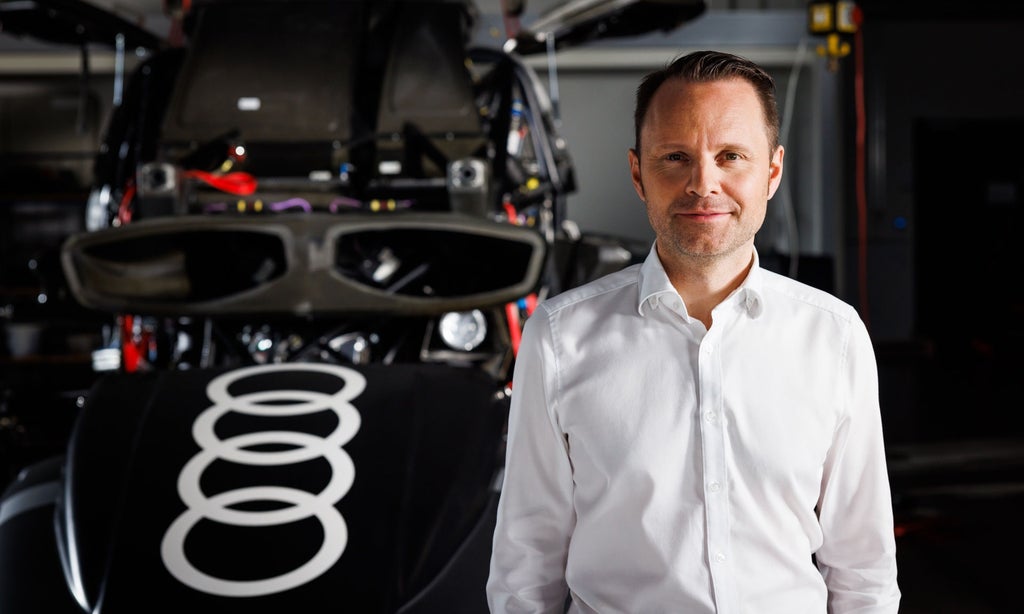
Rolf Michl has been with AUDI AG since 2007. In 2014, he and his team launched the Audi Sport TT Cup, the first one-make super car racing series in Germany, enabling targeted support for international young talent. Since September 2022, Rolf Michl has been Managing Director of Audi Sport GmbH and is responsible for motorsports at Audi.
Rolf Michl has been with AUDI AG since 2007. In 2014, he and his team launched the Audi Sport TT Cup, the first one-make super car racing series in Germany, enabling targeted support for international young talent. Since September 2022, Rolf Michl has been Managing Director of Audi Sport GmbH and is responsible for motorsports at Audi.
“With all the know-how we’ve accumulated, we now expect to race for podium positions.
Rolf Michl
Arnau Niubó Bosch, Development Engineer and Project Manager for Vehicle Deployment at Audi Motorsport, agrees. “When we and our team arrive in Saudi Arabia at the end of December,“ he says, “there’s very little time to get ourselves and the vehicles ready for the start.“ That makes it all the more important to ship the vehicles in the best possible condition, he explains. Born in Spain, Bosch has been with Audi since 2018 and at home in motorsports for around 25 years. But the Dakar Rally was new territory for him as well. “People will tell you a lot about this rally. But to understand it, you have to have experienced it yourself.“ Bosch was there when Audi competed for the first time in January 2022. At the end, they gained four stage victories and a steep learning curve. “We learned a lot about the desert, about the car, but also about the team and the logistics,“ Bosch recalls. Any feedback, be it about the cars or the processes on site, was gathered in a large pool. “In motorsports, many small things often add up to a great leap in development,“ the experienced engineer explains. But Bosch doesn’t just refer to the vehicles. Among other things, he says, a lot has been learned about the supply of spare parts on site or the logistics it takes to pitch and strike your tent at the bivouac while ensuring the vehicles are serviced day after day. “With vast amounts of experience and information, we came together here in Neuburg right after returning from Saudi Arabia and started preparing for the 2023 rally and building the second-generation Audi RS Q e-tron.”
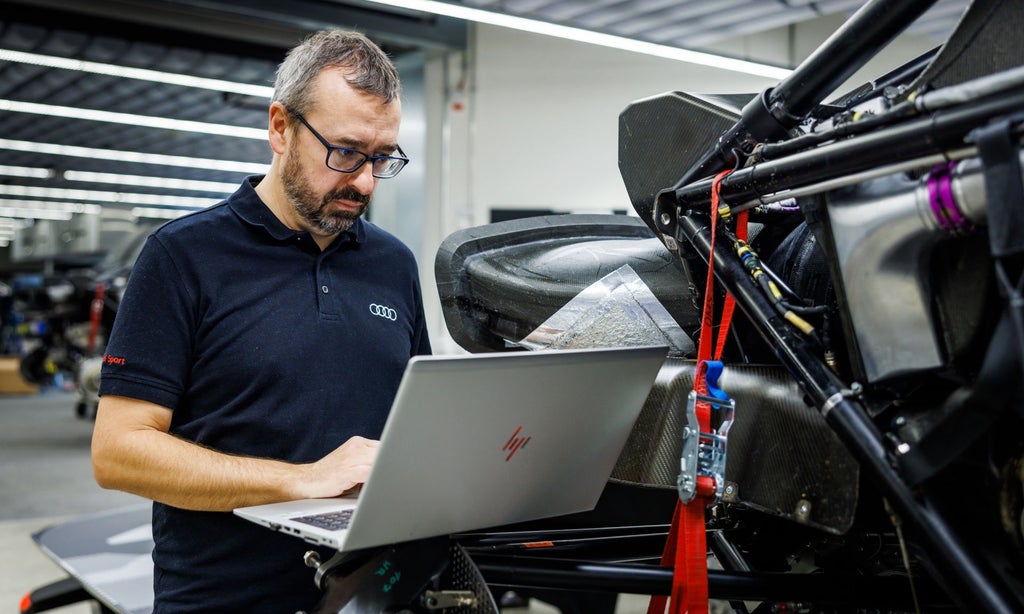
Arnau Nibuó Bosch is responsible for the Audi RS Q e-tron during the races. He was at the 2022 Dakar Rally and will also accompany the upcoming race.
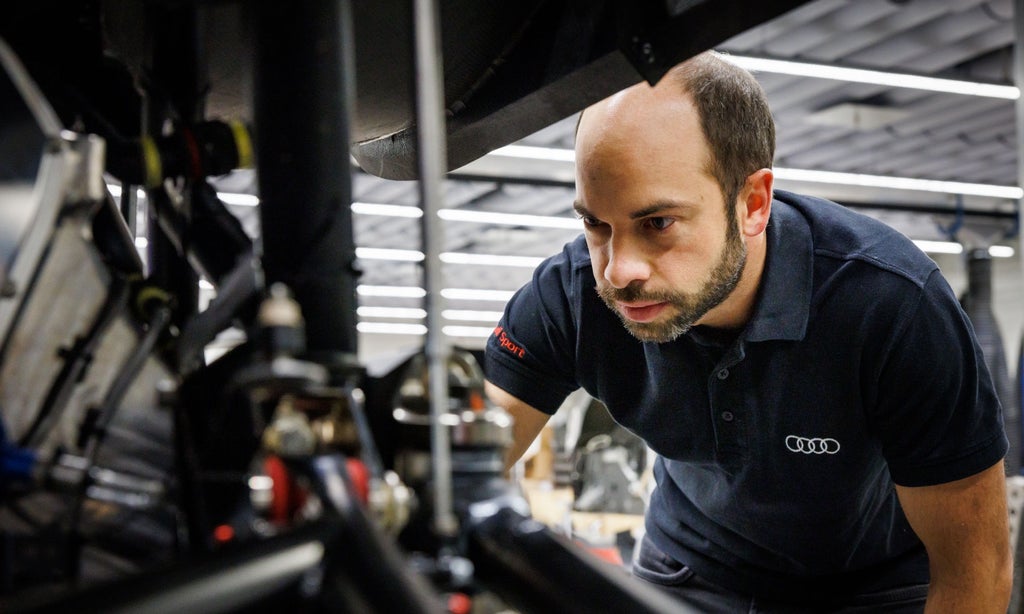
Benedikt Brunninger was already involved in the development of the first Audi RS Q e-tron and is now responsible for the second evolution stage as Technical Project Manager.
Arnau Nibuó Bosch is responsible for the Audi RS Q e-tron during the races. He was at the 2022 Dakar Rally and will also accompany the upcoming race.
Benedikt Brunninger was already involved in the development of the first Audi RS Q e-tron and is now responsible for the second evolution stage as Technical Project Manager.
During the development of the second evolution stage of the Audi RS Q e-tron, Benedikt Brunninger was at the centre of activities. As Technical Project Manager he has been familiar with the Dakar project from the very beginning and was responsible for the first generation of vehicles as well. He draws two main conclusions from the first participation in the rally: “First and foremost, I see confirmation that our vehicles and the innovative drive concept are robust enough to tackle the Dakar Rally.“ But just as importantly, Brunninger also realized “that we’ve built our vehicles even more robustly than necessary.“ For the first Audi RS Q e-tron, the task was to protect the innovative drive concept from as many eventualities as possible. “We didn’t know anything about the requirements for the safety structure around the sensitive high-voltage battery, for instance. Simply because no one had done it before,“ Brunninger explains.
But in hindsight, the very components classified as sensitive had worked without a hitch, and it quickly became clear “that we had room for further development in terms of design and weight.“ Certain parts could become lighter for the new generation, or they were even omitted completely. As a result, the second generation of the rally vehicle does not contain a single body part from its predecessor. The three Audi RS Q e-tron vehicles, which will compete in a few days, are around 80 kilograms lighter than their predecessors. The reduced weight opened up new possibilities in chassis tuning, or making the handling easier for the drivers, for example. Much has also been optimised when it comes to aerodynamics. All in all, the new Audi RS Q e-tron is now even more athletic, agile, and compact. “For me,“ says Brunninger, “the first vehicle was the prototype, but the second generation is the real racing version.“
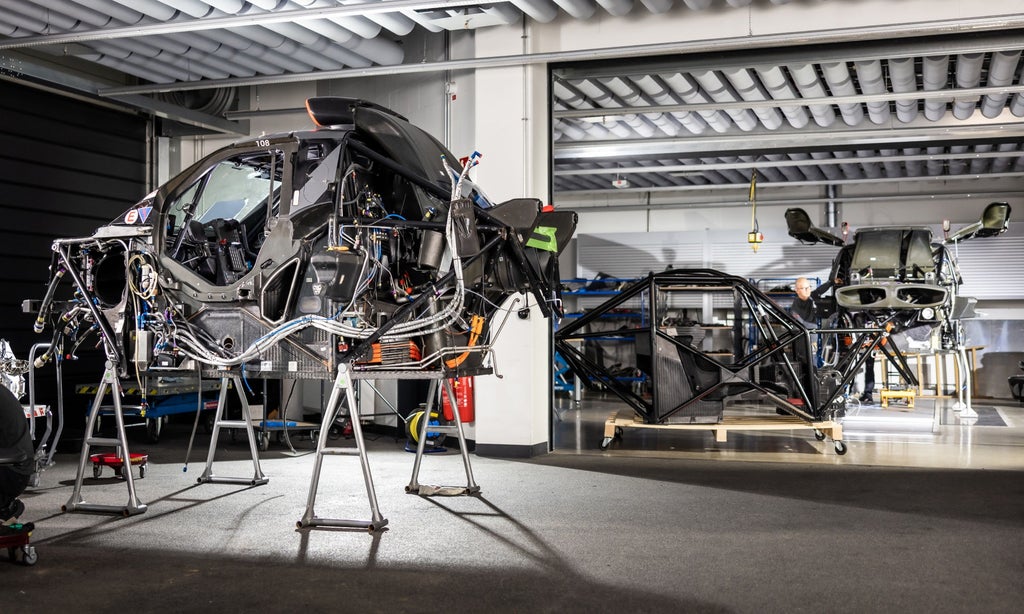
In order to best prepare the rally vehicles for use at the Dakar Rally, all three second-generation Audi RS Q e-tron vehicles were checked down to the smallest detail after the Morocco Rally. When the 2023 Dakar Rally starts on December 31, everything must be prepared in the best possible way.
In order to best prepare the rally vehicles for use at the Dakar Rally, all three second-generation Audi RS Q e-tron vehicles were checked down to the smallest detail after the Morocco Rally. When the 2023 Dakar Rally starts on December 31, everything must be prepared in the best possible way.
And this racing version has delivered promising results in the preparation phase. The last few months went according to plan for Rolf Michl, Arnau Bosch, Benedikt Brunninger and the entire team: around 6,500 test kilometres were driven in Zaragoza and the Moroccan desert over the summer. Before the three Audi RS Q e-tron vehicles were disassembled into their individual parts for the last time, they also gained valuable competition experience at the Morocco Rally in October. “With all the know-how we’ve accumulated,“ Rolf Michl says with confidence, “we now expect to race for podium positions in our second Dakar Rally.“ To this end, the Audi Sport team have prepared themselves and the Audi RS Q e-tron in the best possible way. And yet the unpredictability of the Dakar Rally remains, and nobody can prepare for these uncertainties. “But that,“ says Michl, “is exactly what makes racing and the Dakar Rally so fascinating.“
